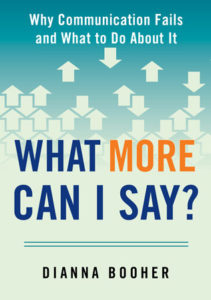


(Forbes first published my article here.)
Would a great conversation substitute for your next Advil or Valium? You might be surprised.
In fact, consider the following “check-up” questions related to your personal communication habits:
If your answers cause sadness rather than satisfaction, then you may need a communication adjustment. In fact, have you noticed that many of your colleagues, clients—and maybe even family members—resist a real conversation?
Ten days ago I opened a ticket with the support team on a publishing site because my login no longer worked. Every couple of days after opening the ticket, I emailed again to ask for assistance. Each time, an auto-response that didn’t help arrived in my inbox.
So I then started calling the phone number at the bottom of their email. Again, rather than a call-back, I got an email response—somewhat tailored to the issue but no solution.
Finally, in sheer frustration, I phoned the second level support team. A live person answered and promised a call-back in “a few minutes” from Amy, the manager of all levels of support.
Thrilled at finally getting to someone who could help, I waited. And waited. And waited. Two days later, the manager emailed rather than phoned. Her message: “I’m copying the support team to follow up with you.”
Full circle. All without ever having a conversation—or a solution! Not uncommon today.
While education may inform us, conversation completes us as humans. Reflect on what some of the great philosophers and authors have had to say about the critical nature of meaningful one-to-one conversation:
“The best of life is conversation, and the greatest success is confidence, or perfect understanding between sincere people.”—Ralph Waldo Emerson
“Sweet discourse—the banquet of the mind.”—John Dryden
“Conversation is an account of ourselves…. Conversation is the vent of character as well as of thoughts…It is the laboratory of the student.”—Ralph Waldo Emerson
Do you remember those dorm parties or campfire outings when you huddled in a group and talked all night? Do you remember those heated discussions in a psychology, sociology, or history class when you exchanged answers that—had they been implemented in society—would have changed the world? Back then, you might have agreed with Anne Morrow Lindbergh’s observation: “Good conversation is a stimulating as black coffee, and just as hard to sleep after.”
All your relationships in life are the result of your interactions stacked end to end between you and another person. Conversation connects us with other human beings.
But it takes both talking and listening to make communication complete. Think what a release and relief you feel when someone truly “hears you out.” We hesitate sometimes to “interfere” with a friend’s busy schedule. But is it really interference to initiate a conversation? Consider what a noble feeling you have when you’ve listened well to someone and offered them the gift of understanding.
If you want to breathe fresh air into your life and relieve stress, make up your mind to talk—really talk—to someone for an extended time. Call a friend for no particular reason and talk about something important to you. Hear their thoughts on the subject. Listen to their reactions to what you say. Brainstorm together about common problems and related solutions.
And if your colleagues and friends are living at such a hectic pace that they can’t find the time for conversations, share your thoughts with an elderly family member.
Or go to a senior living facility, and you’ll find a ready audience—and often deep wisdom. Even as a teenager, I often visited our local assisted-living facility as part of a service organization, and can still recall the calmness stirred inside me when some of the residents there gave me their undivided attention for 15 minutes. Such interactions almost always led to provocative reflection.
In this era of disconnection with family and work-at-home arrangements away from colleagues, engaging in a deep conversation can make you feel alive again.
Improve your conversation skills with What More Can I Say: Why Communication Fails and What to Do About It.
